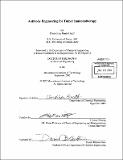Antibody engineering for tumor immunotherapy
Author(s)
Graff, Christilyn Paula
DownloadFull printable version (5.521Mb)
Other Contributors
Massachusetts Institute of Technology. Dept. of Chemical Engineering.
Advisor
K. Dane Wittrup.
Terms of use
Metadata
Show full item recordAbstract
Antibodies have been used as cancer therapeutics for several decades. One area in which this therapy may be improved is the retention time of antibody in the tumor relative to normal tissue. In this Thesis, we have attempted to elucidate the mechanisms that are most influential to improving antibodies as cancer therapeutics. Carcinoembryonic antigen (CEA) has long been identified as a tumor-associated antigen. CEA is also quite stable, with a cell-surface shedding half-life of approximately 7 days. Directed evolution methodology has been utilized to design an antibody fragment with properties that would improve tumor retention. Specifically, antibody engineering methods were used to produce a humanized, extremely high affinity and stable single chain antibody fragment (scFv) against CEA. Several mutant scFv libraries were constructed and screened against soluble CEA with yeast surface display and fluorescent activated cell sorting (FACS). A series of antibodies were engineered that span three orders of magnitude in off-rate improvement. These antibody fragments show excellent stability at physiologically relevant temperatures. In addition, soluble protein expression levels were greatly improved. The final product has a dissociation half-life of approximately 7 days, currently the longest engineered half-life of an scFv against a tumor-associated antigen. Binding and diffusion in micrometastases was also modeled to gain an improved understanding of the quantitative interplay among the rate processes of diffusion, binding, degradation, and plasma clearance in tumor microspheroids. (cont.) Modeling studies illuminated the importance of targeting stable tumor-associated antigens. The elimination rate of the antigen was of critical importance to the change in the therapeutic effect of antibodies with increasing affinity. The significance of this result in the context of previous experimental studies will be discussed. By affinity maturing an antibody with a dissociation half-life equal to the turnover half-life of the antigen, we have engineered an antibody with effectively irreversible binding to CEA. Differences in retention for the series of scFvs will thus be dominated by the off-rate of the antibody and not the half-life of CEA. With this in mind, the molecules designed in this study can be used to reconcile the issue of affinity's impact on efficacy in tumor therapy.
Description
Thesis (Ph. D.)--Massachusetts Institute of Technology, Dept. of Chemical Engineering, 2002. Vita. Includes bibliographical references (leaves 130-140).
Date issued
2002Department
Massachusetts Institute of Technology. Department of Chemical EngineeringPublisher
Massachusetts Institute of Technology
Keywords
Chemical Engineering.